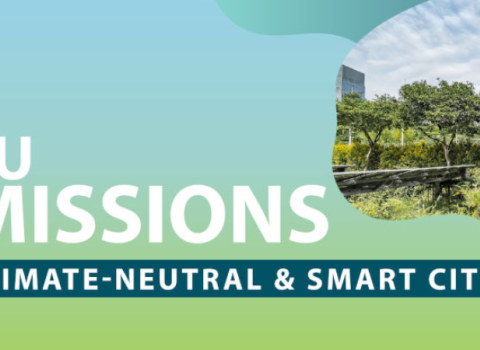Anyone with a knowledge of the recent history of innovation policy could have predicted the broad-brush Missions set up under Horizon Europe would not have a smooth ride. With preparations for Framework Programme 10 underway, it is time for a rethink

William Burns, a consultant in science and research policy at Science Think Tank
In my view, the Horizon Europe Missions will fail because their designers were carried along by rhetoric and never really took the right lessons from past experience. These include the need for backing from a charismatic political leader and a clever mix of industrial, economic, environmental and social goals that appeal across the political spectrum.
I believe the example Europe should have studied is the Indian government’s 'technology missions', set up from 1987 onwards with well-defined objectives, scopes, and implementation timelines. These transformed the Indian state, framing future success in IT and biotechnology, through approaches that are politically smart and which ought to have been considered in the EU.
The failure to look for possible role models - or to consider previous EU experience - has gone on to undermine the Horizon Europe Missions. For that reason, I am not calling for a rewrite of the EU Missions policy as part of the planning for the next EU research programme, FP10, or for increases in budget, because that could not resolve the underlying misconceptions. A fundamental re-think is required, but if after a few months of work that re-think still proves uninspiring, the policy is a dead end and should be abandoned as soon as possible.
Diluting the goals until they appear deliverable, as has happened, seems to call into question the wisdom of the original goals and I would not recommend that either.
The European Commission cannot stop cancer, restore oceans, decarbonise cities, and so on, even in theory, because a small number of officials in Brussels could never achieve these objectives no matter how hard they tried, or how clever they were.
Efforts on cancer have been made for decades but are hamstrung by pollution and inequality as well the complex biological nature of the disease; restoring the oceans means stopping plastic production; and decarbonising cities means not burning stuff.
One hundred years
No amount of finessing of the written aims, administrative restructuring in the Commission or even increases in budget could bring us to a point where the Missions policy would remake Europe in the ways needed; maybe over a hundred years, but not over the next six.
You could say the Missions were a cover to pretend to be doing something about societal problems, while actually doing very little, which is a regrettable but common use of science policy.
Incremental improvements such as availability of cancer screening, or reducing air and water-borne pollution, should be part of the normal work of government that citizens expect and demand, not assigned to special Missions.
Instead of looking outwards for abstract problems which everyone ought to know it cannot possibly solve, the Commission should focus on the problems it must solve and could conceivably do so, based on its track-record.
Taking inspiration from the successful Indian policy, that could mean a mix of industrial-economic, environmental and social goals that would be likely to energise all the mainstream political groups, be designed to engage business and government, and to encourage untapped forces in science and research.
It may be difficult to find political room for this, but it is worth the time and effort, because we are in a long game. It might be the case that all the big gains have already been wrung from the EU single market and information technology (despite the current agitation about AI and advanced semiconductors). With the low hanging fruit having been picked, creative thought will be needed on what comes next, but here also is a huge opportunity for Europe which no one else grasped.
Fortunately, we already accumulated a lot of experience of what might work, across more than 40 years of effort to build a pan-European science and industrial policy.
In addition, the Indian government technology missions provide further food for thought. I would suggest they are a more apt model for the EU than the US moon shot, which is usually looked to when defining what a science-led mission should look like.
The Indian policy was the most dramatic of its kind over the last few decades; becoming a topic in the science policy literature of the 1990s and inspiring other governments such as in South Africa.
In the late 1980s, the Indian prime minister Rajiv Gandhi reacted to critics of previous science policy and with his adviser the telecoms entrepreneur, Sam Pitroda, chose applied missions including vaccines, oilseeds and telecommunications. The roots of India’s thriving IT and biotechnology industries can be traced back to these programmes.
The EU, like the Indian government, had a successful track record of delivering science and technology policies, but lacked a powerful and charismatic figure like Rajiv Gandhi or a personality like Pitroda; nor, crucially, could it command national bureaucracies - akin to the Indian civil service - to deliver on its goals.
Overall, when assessing the Horizon Europe Missions and what happens to them in FP10, I believe policymakers have to confront the underlying reality, namely, that EU science policies have always featured mission-like qualities, such as riskiness, concertation/cooperation and purpose, and that all options have therefore already been tried and tested.
To take one relatively recent example, the Urban Innovative Actions, a €372 million programme that ran from 2014 – 2020, should have been a starting point for the cities mission but disappeared from the collective memory after the final assessment was published in January 2021.
As early as the first framework programme, now 40 years ago, the Commission defined 'thematic priorities' for R&D, such as industrial competitiveness, raw materials, energy, and living conditions, with the purpose of weaving together science and other aspects into a coordinated whole.
The language may have been different from that used to describe the objectives of the Horizon Europe missions, but I do not think that signifies differences of intent.
Indeed, looking back over the past 40 years, a picture emerges of European institutions obsessed with mission-type activities, with a view that science policy is only valuable when it shapes the economy and society.
This track record could have informed the Horizon Europe missions. It would have helped in the setting of goals that gave confidence to stakeholders and broadened the basis for action. Instead, the European Commission described the Missions as “a novelty” of Horizon Europe.
I believe that set the Missions up to fail.
William Burns is a consultant in science and research policy at Science Think Tank.





 A unique international forum for public research organisations and companies to connect their external engagement with strategic interests around their R&D system.
A unique international forum for public research organisations and companies to connect their external engagement with strategic interests around their R&D system.